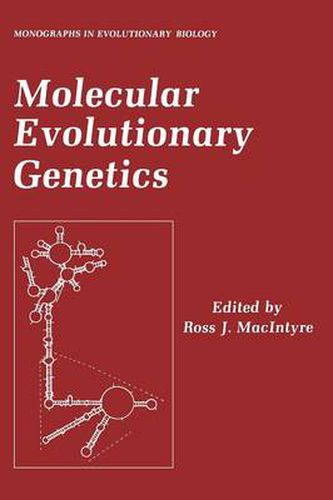Readings Newsletter
Become a Readings Member to make your shopping experience even easier.
Sign in or sign up for free!
You’re not far away from qualifying for FREE standard shipping within Australia
You’ve qualified for FREE standard shipping within Australia
The cart is loading…






This title is printed to order. This book may have been self-published. If so, we cannot guarantee the quality of the content. In the main most books will have gone through the editing process however some may not. We therefore suggest that you be aware of this before ordering this book. If in doubt check either the author or publisher’s details as we are unable to accept any returns unless they are faulty. Please contact us if you have any questions.
This volume in the Monographs in Evolutionary Biology series addresses issues that are part of an emerging area of research loosely called mo lecular evolution.
Its practitioners include both molecular biologists cu rious about the evolutionary implications of their data and evolutionary biologists pushing their analyses to the molecular level. The union of these fields of molecular and organismal biology has been turbulent at times, and, as shall be seen, this dialectic has led to some very serious challenges to long-held notions about the role of natural selection in evolution and the economy of genome organization in eukaryotes. As an inevitable outgrowth of molecular biology, molecular evolution is necessarily a young discipline, but it can already point proudly to two major discoveries. The first, is the molecular clock, a concept that has emerged from the analysis of at least four data sets-amino acid sequences, immunologic data, DNA renaturation studies, and, recently, analyses of DNA sequences. The reality of a strong stochastic component in the evolution of nucleotide sequences can no longer be doubted, although the accuracy of the clock with regard to particular sequences and within particular groups of or ganisms should be independently measured each time it is used. Never theless, molecular clocks will assume increasingly important roles in phy logenetic reconstructions, especially since the fossil record is so fragmentary. The second major discovery of molecular evolution has been the incredible complexity of the eukaryotic genome.
$9.00 standard shipping within Australia
FREE standard shipping within Australia for orders over $100.00
Express & International shipping calculated at checkout
This title is printed to order. This book may have been self-published. If so, we cannot guarantee the quality of the content. In the main most books will have gone through the editing process however some may not. We therefore suggest that you be aware of this before ordering this book. If in doubt check either the author or publisher’s details as we are unable to accept any returns unless they are faulty. Please contact us if you have any questions.
This volume in the Monographs in Evolutionary Biology series addresses issues that are part of an emerging area of research loosely called mo lecular evolution.
Its practitioners include both molecular biologists cu rious about the evolutionary implications of their data and evolutionary biologists pushing their analyses to the molecular level. The union of these fields of molecular and organismal biology has been turbulent at times, and, as shall be seen, this dialectic has led to some very serious challenges to long-held notions about the role of natural selection in evolution and the economy of genome organization in eukaryotes. As an inevitable outgrowth of molecular biology, molecular evolution is necessarily a young discipline, but it can already point proudly to two major discoveries. The first, is the molecular clock, a concept that has emerged from the analysis of at least four data sets-amino acid sequences, immunologic data, DNA renaturation studies, and, recently, analyses of DNA sequences. The reality of a strong stochastic component in the evolution of nucleotide sequences can no longer be doubted, although the accuracy of the clock with regard to particular sequences and within particular groups of or ganisms should be independently measured each time it is used. Never theless, molecular clocks will assume increasingly important roles in phy logenetic reconstructions, especially since the fossil record is so fragmentary. The second major discovery of molecular evolution has been the incredible complexity of the eukaryotic genome.